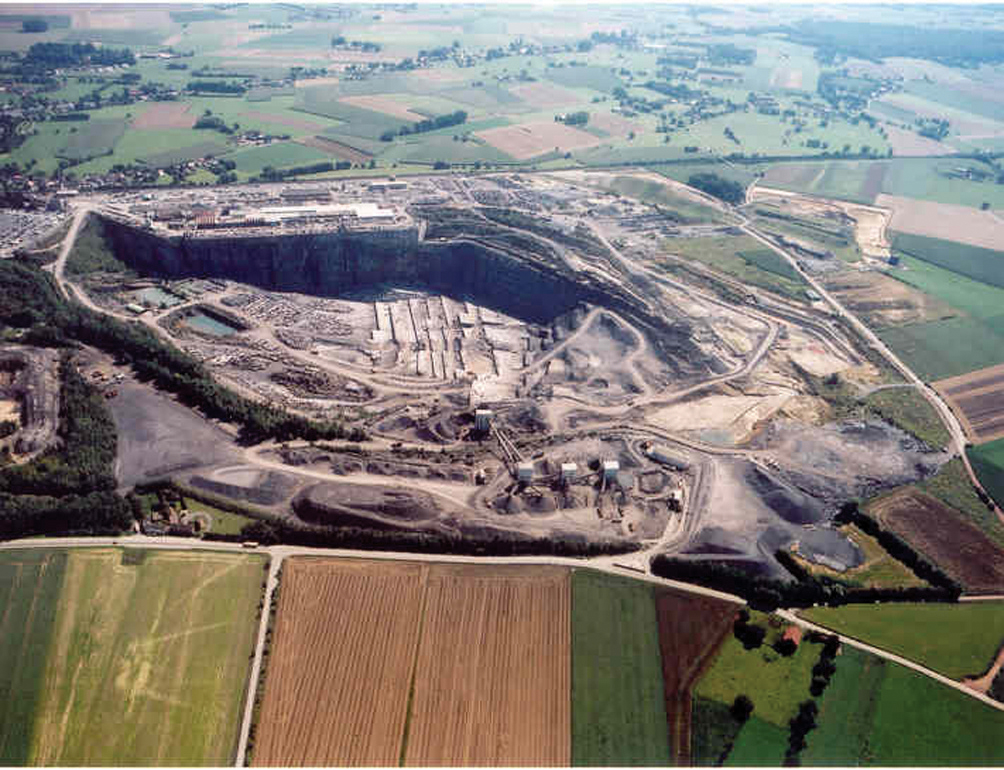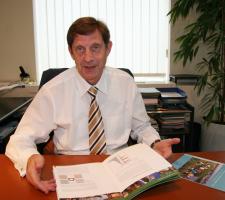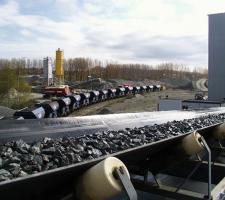
Denis Mertens took on the role of president of the European Aggregates Association just four months ago, but he is already building a clear view of his strategy to take the industry forward. He talked to Claire Symes about his plans
Adding biodiversity and promoting public understanding of the need for aggregates are just two of many challenges facing the European aggregates sector, according to new
Belgian-born Mertens took on the presidency of the UEPG from France's Didier Audibert during the association's 20th anniversary celebrations in May. Mertens will hold the post for two years and combine it with his role of director general of Gralex, a joint venture of
Aggregates may be Mertens passion now but when he was younger, his career aspirations where somewhat different. While he still wanted to be involved in shaping the built environment, he wanted to be designing it as an architect rather than producing the building materials themselves. "I think architecture offers a real connection between living and civilisation and the protection of our surroundings," he explained.
But Mertens discovered he also had a passion for figures and studied Economics at two universities in Belgium - Mons and Leuven - for firstly his degree and later his PhD. After graduating, Mertens joined an international agricultural equipment company before moving into the petroleum industry with Texaco.
His first experience of the aggregates sector came in 1989 when he joined
Mertens is no stranger to promoting the cause of the aggregates industry - until last year he held the presidency of the Belgian Federation of Non-energy Extractive Industries (FEDIEX).
"It's an honour to be asked to be president of the UEPG and it is good to be able to return the investment in the industry," said Mertens. "I have spent my first few months in the role getting the feel of the issues affecting the individual counties that make up our member associations and building relations with our team of permanent staff in Brussels.
"I have managed to visit several of our national member associations so far and my aim is to continue with these visits to give me a clearer view of the differences within the industry around Europe. Although it is still early days, I am starting to get a clearer idea on the direction I want to take over the next few years."
Business plan
According to Mertens, Audibert's predecessor Manfred
"The credibility of the industry also needs to be underlined - if we make promises, we must make sure they are delivered and that the results can be measured. Developing reliable and accurate statistical data is a real challenge for the UEPG but it is essential that we tackle this to allow us to chart the progress of health and safety in the industry and prove that it is changing for the better." Sustainability is also a target of the UEPG's business plan. "We need to demonstrate that the industry has a clear view on what sustainability is," said Mertens. "This is vital for another of the aims which is proactivity - the need for the industry to seen to be self managing and addressing the challenges - and is also linked to our visibility targets.
"In terms of sustainability, aggregates contribute to all three pillars of sustainability - economic, social and environmental. We need to ensure that the contribution of aggregates to sustainable development is a positive one. The final objective in the business plan is to promote responsibility - to ensure our sector operates within the competition laws and has a clear mandate." While Mertens will be working to further the cause of the business plan during his two years at the helm of the UEPG, he said that there are also several other issues that are close to his heart that he plans to work on.Dual role
While Mertens' presidency of the UEPG is an important task, he will be combining it with his role as director general of Gralex, which is one of the market leaders in the Belgian aggregates industry. In 2006, the business had a turnover of €90million and a market share of around 20% in Belgium.
Gralex has 16 active quarries across Belgium, extracting gravel, limestone, porphyry and sandstone, which produce around 10million tonnes of aggregate annually.
"Production volumes of virgin aggregate are stable at the moment in Belgium," said Mertens. "There is growth but this is being absorbed by increases in recycling."
Contrary to many other aggregate companies in Europe, Gralex has taken the strategic step to move out of the recycling market. "The quarrying business is our core focus and we decided to sell our recycling and expanded clay products operations several years ago," explained Mertens.
"In my mind recycled aggregates should maintain the quality or the original material and not just be used for low grade applications. At the moment this is not happening and I did not want Gralex to be perpetuating this. Current uses of recycled aggregate mostly just taking the place of other low grade quarry products, so is not actually achieving anything as it is removing any value from the low grade virgin material. More research is needed to find better ways of using recycled material."
According to Mertens, the Belgian market is an interesting one to work in. "Belgium is a small country with a high population density," he said. "This combined with the country's good road and water transport network and our geographical spread of quarries means that we can deliver to the whole country. Being a medium sized company gives us real flexibility to move with the market too."
"There are three things that I want to target and develop over the next two years - access to aggregate resources, biodiversity and the understanding of the life cycle of aggregates through recycling," he said.
In terms of resources, Mertens said that the industry needs to work with the public to change the current culture of NIMBYism (not in my back yard) that is restricting the granting of new planning permissions for quarries. "This is linked to the visibility aim of the business plan," he said. "The problem in convincing people of the need for aggregate extraction is that the source may not necessarily be in the same area as the market for the material, so if people can't see the local benefit of quarrying they tend to be against it.
"Most quarries have a lifespan of 20 to 25 years but local area plans are normally developed for the next five to 20 years, so the industry needs to be thinking two quarries ahead to ensure there are adequate reserves.
Added biodiversity
"The industry needs to demonstrate more effectively that a quarry can result in added biodiversity in an area through creation of new habitats and restoration of endangered ones. With the right strategies, the foot print the quarrying industry leaves on the landscape can be a good one. If we promote our successes in this field, then people might start to accept quarrying as a necessary process but not one that has to be harmful to the environment.
"Linked to this is the need to recycle more and not just reuse material for low grade applications but opt for processes and applications that maintain the quality of the aggregate. The actual extraction should only be the start of the aggregate lifecycle with the material being reused three or four times." According to Mertens, the industry needs to start developing portfolios of up to date examples of good practice and successful initiatives to show the capability that exists within the European industry. "The range and number of entries to our recent sustainability awards show that the projects are out there but we need to be more effective in communicating this with the public," he said. "We will be encouraging the industry to demonstrate a more proactive approach and hope to see this coming through in the entries for the 2009 awards." Another issue that Mertens said is essential for the continuing prosperity of the industry in Europe is attracting young people into the sector. "Improving the image of the industry is critical to increasing the number of people entering all levels of the industry from management through to operators," he said. "While graduates may be able to earn more through careers sectors such as banking, quarrying can offer a very satisfying option that allows people to contribute to ecology as well as be involved in a thriving industry. The new technological development of equipment in quarries will also help to attract new operators - the latest machines are easier to operate and the joystick style systems may well appeal to the Playstation generation."
Exciting times
This is an exciting time to be involved in the European aggregates sector, according to Mertens. "The growing internationalisation of the business and integration of different quarrying companies means that sector is dynamic and Europe is becoming more important," he said. "The current construction boom also means that demand for aggregates is likely to remain steady for some time, placing the industry in a good position to plan for the future."
















